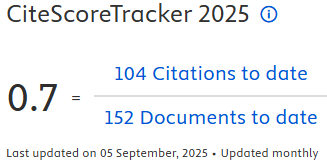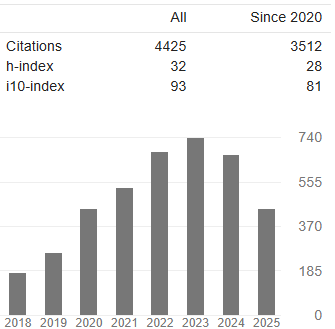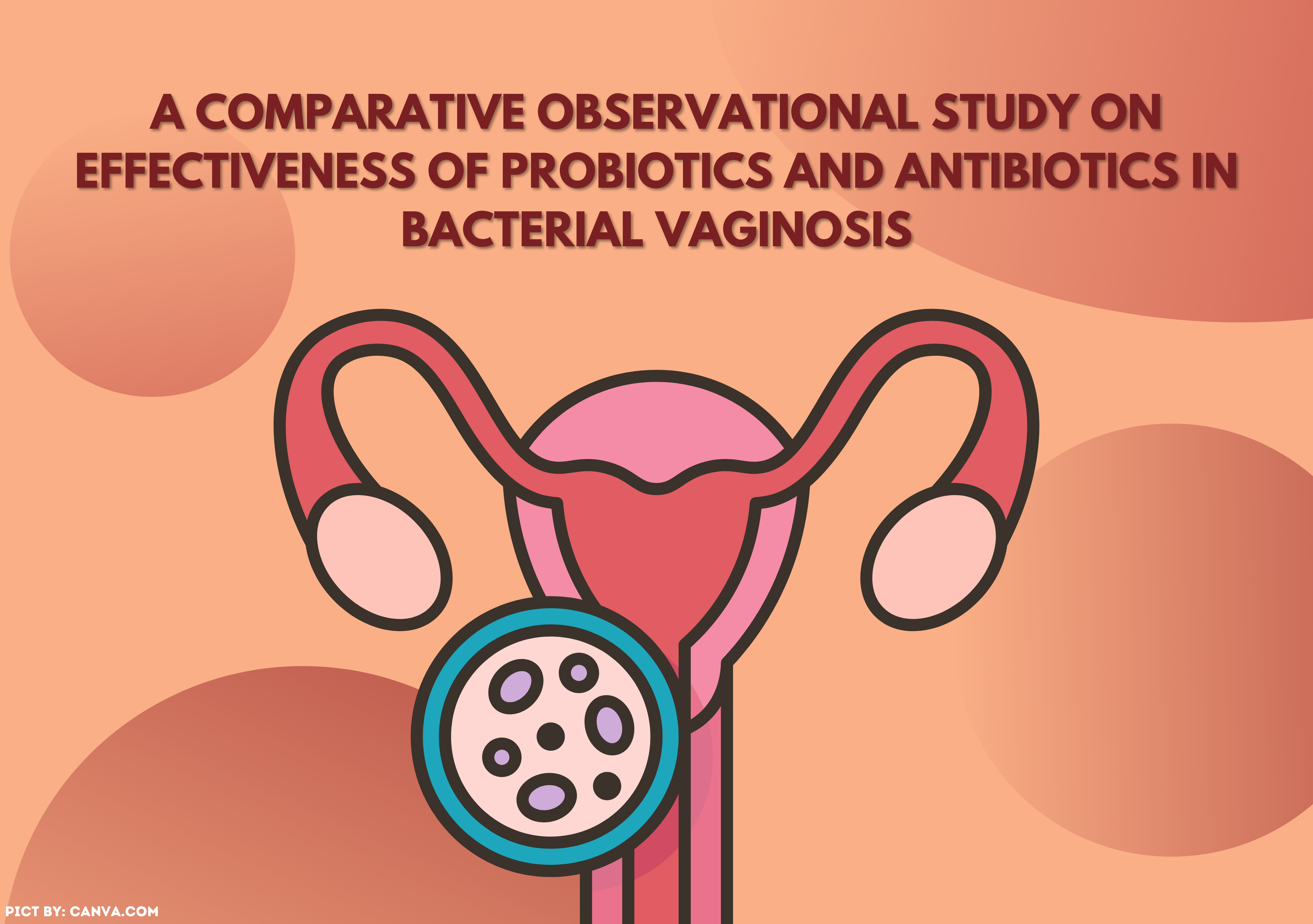FLASHCARD-BASED ONLINE EDUCATIONAL GAME FOR IMPROVING HIV-AIDS KNOWLEDGE AND STIGMA

Introduction: The burden of HIV-AIDS cases in Indonesia remains high, while HIV-AIDS promotion programs targeting students remain low. Game-based learning has not been investigated as an alternative method for improving HIV-AIDS awareness among students. Aims: this study quantifies the impact of the flashcard-based educational game invented by YARSI HIV-AIDS Care on high school students in Jakarta. Method: A simple randomized controlled study was conducted among 112 SMA 27 Jakarta students (intervention, n=56; control, n= 56). The HIV-AIDS knowledge and attitude scores before and after the educational game were evaluated using a validated questionnaire. An intervention using a flashcard-based game is conducted online. Univariate and Bivariate analyses of the pre-and post-scores for both groups were performed. Result: Following the game, there was a considerable improvement in the HIV-AIDS comprehensive knowledge scores (pre-test vs. post-test, 65 vs. 90, p<0.01), while the control score remained unchanged. The intervention group also had higher knowledge and attitude scores than did the control group (p<0.01). Conclusion: Flashcard-based education games significantly increased comprehensive HIV-AIDS knowledge and positive attitudes toward HIV-AIDS. Thus, this method could be implemented in HIV-AIDS promotion programs that target students
Alemi, Q., & Stempel, C. (2019). Association between HIV knowledge and stigmatizing attitudes towards people living with HIV in Afghanistan: Findings from the 2015 Afghanistan Demographic and Health Survey. International Health, 11(6), 440–446. https://doi.org/10.1093/inthealth/ihz013
Ding, D., Guan, C., & Yu, Y. (2017). Game-Based Learning in Tertiary Education: A New Learning Experience for the Generation Z. International Journal of Information and Education Technology, 7(2), 148–152. https://doi.org/10.18178/ijiet.2017.7.2.857
Directorate General of Disease Prevention and Control, M. of H. I. (2018). Report on the Progress of HIV-AIDS and Sexually Transmitted Infections (STIs) Quarter IV 2017.
Directorate General of Disease Prevention and Control, M. of H. I. (2019). Report on the Progress of HIV-AIDS and Sexually Transmitted Infections (STIs) Quarter IV 2018. Ministry of Health Indonesia. https://doi.org/10.1017/CBO9781107415324.004
Directorate General of Disease Prevention and Control, M. of H. I. (2020). Report on the Progress of HIV-AIDS and Sexually Transmitted Infections (STIs) Quarter IV 2019.
Edi, & Taufik, M. (2019). Permainan Ular Tangga Sebagai Media Edukasi Seksualitas Remaja. Jurnal Endurance : Kajian Ilmiah Problema Kesehatan, 4(1), 442–448. https://doi.org/10.22216/jen.v4i2.4280
Gauthier, A., Kato, P. M., Bul, K. C. M., Dunwell, I., Walker-Clarke, A., & Lameras, P. (2018). Board Games for Health: A Systematic Literature Review and Meta-Analysis. Games for Health Journal, 8(2), 85–100. https://doi.org/10.1089/g4h.2018.0017
Harapan, H., Feramuhawan, S., Kurniawan, H., Anwar, S., Andalas, M., & Hossain, M. B. (2013). HIV-related stigma and discrimination: A study of health care workers in Banda Aceh, Indonesia. Medical Journal of Indonesia, 22(1), 22–29. https://doi.org/10.13181/mji.v22i1.518
Hong, S. Y., Thompson, D., Wanke, C., Omosa, G., Jordan, M. R., Tang, A. M., Patta, S., Mwero, B., Mjomba, I., & Mwamburi, M. (2012). Knowledge of HIV transmission and associated factors among HIV-positive and HIV-negative patients in rural Kenya. Journal of AIDS and Clinical Research, 3(7), 1–13. https://doi.org/10.4172/2155-6113.1000170
James, T. G., & Ryan, S. J. (2018). HIV knowledge mediates the relationship between HIV testing history and stigma in college students. Journal of American College Health, 66(7), 561–569. https://doi.org/10.1080/07448481.2018.1432623
Kesumawati, K. A. S. (2019). Hubungan pengetahuan remaja tentang hiv/aids dengan perilaku seksual remaja di smk mutiara kota bandung. Journal of Midwifery and Public Health, 1(2). https://doi.org/10.25157/jmph.v1i2.3004
Kusuma, M. T. P. L., Kidd, T., Muturi, N., Procter, S. B., Yarrow, L., & Hsu, W.-W. (2020). HIV knowledge and stigma among dietetic students in Indonesia: implications for the nutrition education system. BMC Infectious Diseases, 20(1), 663. https://doi.org/10.1186/s12879-020-05379-8
Kyrychenko, P., Kohler, C., & Sathiakumar, N. (2006). Evaluation of a School-Based HIV/AIDS Educational Intervention in Ukraine. Journal of Adolescent Health, 39(6), 900–907. https://doi.org/10.1016/j.jadohealth.2006.06.006
Liao, Y., Chang, L. E., & Chang, C.-C. (2010). Game-based Learning vs. Traditional Instruction: A Meta-Analysis of Thirty-Eight Studies from Taiwan. Technology and Teacher Education Annual Vo - Conf 21, March 2010, 1491.
Mak, W. W. S., Mo, P. K. H., Ma, G. Y. K., & Lam, M. Y. Y. (2017). Meta-analysis and systematic review of studies on the effectiveness of HIV stigma reduction programs. Social Science and Medicine, 188, 30–40. https://doi.org/10.1016/j.socscimed.2017.06.045
Mak WW, Cheng SS, Law RW, Cheng WW, C. F. (2015). Reducing HIV-related stigma among health-care professionals: A game-based experiential approach. AIDS Care - Psychological and Socio-Medical Aspects of AIDS/HIV, 27(7), S46–S56. https://doi.org/10.1080/09540121.2015.1007113
Ministry of Health Indonesia. (2013). Indonesia Demographic and Health Survey 2012 Statistics Indonesia National Population and Family Planning Board Ministry of Health MEASURE DHS ICF International. 1–544.
Ministry of Health Indonesia. (2019). Indonesia Health Profile 2018 (R. Kurniawan, Yudianto, B. Hardhana, & T. Siswanti (eds.)). Ministry of Health Indonesia.
Mwale, M., & Muula, A. S. (2017). Systematic review: A review of adolescent behavior change interventions [BCI] and their effectiveness in HIV and AIDS prevention in sub-Saharan Africa. BMC Public Health, 17(1), 1–9. https://doi.org/10.1186/s12889-017-4729-2
National Institute of Health Research and Development. (2010). Baseline Health Research 2010. In Ministry of Health Indonesia.
Noda, S., Shirotsuki, K., & Nakao, M. (2019). The effectiveness of intervention with board games: a systematic review. BioPsychoSocial Medicine, 13(1), 22. https://doi.org/10.1186/s13030-019-0164-1
Nwokolo, C., Anyamene, A., Anyachebelu, E., & Obum-Okeke, I. (2011). Influence of the knowledge of HIV/AIDS on behaviour change among adolescents in Anambra State, Nigeria. International Journal of Psychology and Counselling, 3(8), 154–158.
Peskin, M., Shegog, R., Markham, C., Thiel, M., Baumler, E., Addy, R., Gabay, E., & Emery, S. (2015). Efficacy of It's Your Game-Tech: A Computer-Based Sexual Health Education Program for Middle School Youth. J Adolesc Health, 56(5), 515–521. https://doi.org/10.1016/j.jadohealth.2015.01.001
Rice, N. C., Guru, A., Keeler, C. N., Keshwani, D. R., & Keshwani, J. (2018). Comparison of game-based learning and traditional lecture approaches to improve student engagement and knowledge transfer in STEM education. ASEE Annual Conference and Exposition, Conference Proceedings, 2018-June. https://doi.org/10.18260/1-2--30209
Rohrbach, L. A., Donatello, R. A., Moulton, B. D., Afifi, A. A., Meyer, K. I., & De Rosa, C. J. (2019). Effectiveness Evaluation of It's Your Game: Keep It Real, a Middle School HIV/Sexually Transmitted Infection/Pregnancy Prevention Program. Journal of Adolescent Health, 64(3), 382–389. https://doi.org/10.1016/j.jadohealth.2018.09.021
Sallam, M., Alabbadi, A. M., Abdel-Razeq, S., Battah, K., Malkawi, L., Al-Abbadi, M. A., & Mahafzah, A. (2022). HIV Knowledge and Stigmatizing Attitude towards People Living with HIV/AIDS among Medical Students in Jordan. International Journal of Environmental Research and Public Health, 19(2), 1–15. https://doi.org/10.3390/ijerph19020745
Saputra, G. (2008). GAMBARAN PENGETAHUAN SIKAP DAN PERILAKU TERKAIT HIV AIDS PADA SISWA KELAS 3 SMA PGRI 1 KOTA BOGOR TAHUN 2008. Universitas Indonesia.
Sen, L. T., Hutauruk, P. M. S., Putra, M. R. A., Maulida, S. B., Ramadhan, A., & Sugiharto, A. (2021). Scrutinizing the knowledge and stigma of HIV/AIDS in the community level in Indonesia and the correlation to risk groups aversion to screening. IOP Conference Series: Earth and Environmental Science, 716(1). https://doi.org/10.1088/1755-1315/716/1/012089
Shah, S., Elgalib, A., Al-Wahaibi, A., Al-Fori, M., Raju, P., Al-Skaiti, M., Al-Mashani, H. N., Duthade, K., Omaar, I., Muqeetullah, M., Mitra, N., Shah, P., Amin, M., Morkos, E., Vaidya, V., Al-Habsi, Z., Al-Abaidani, I., & Al-Abri, S. S. (2020). Knowledge, Attitudes and Practices Related to HIV Stigma and Discrimination Among Healthcare Workers in Oman. Sultan Qaboos University Medical Journal, 20(1), e29–e36. https://doi.org/10.18295/squmj.2020.20.01.005
Shewarega, E. S., Fentie, E. A., Asmamaw, D. B., Negash, W. D., Fetene, S. M., Teklu, R. E., Aragaw, F. M., Alemu, T. G., Eshetu, H. B., & Belay, D. G. (2022). Sexually transmitted infections related care-seeking behavior and associated factors among reproductive age women in East Africa: a multilevel analysis of demographic and health surveys. BMC Public Health, 22(1), 1–11. https://doi.org/10.1186/s12889-022-14120-w
Siregar, P. D., BM, S. H., & Indraswari, R. (2018). Evaluasi Efektivitas Permainan Ular Tangga Hiv/Aids Terhadap Peningkatan Pengetahuan Tentang Hiv/Aids Pada Siswa Sma Di Kota Semarang. Jurnal Kesehatan Masyarakat (e-Journal), 6(2), 170–178.
Swenson, R. R., Rizzo, C. J., Brown, L. K., Vanable, P. A., Carey, M. P., Valois, R. F., DiClemente, R. J., & Romer, D. (2010). HIV knowledge and its contribution to sexual health behaviors of low-income African American adolescents. Journal of the National Medical Association, 102(12), 1173–1182. https://doi.org/10.1016/S0027-9684(15)30772-0
Ungan, M., & Yaman, H. (2003). AIDS knowledge and educational needs of technical university students in Turkey. Patient Education and Counseling, 51(2), 163–167. https://doi.org/10.1016/S0738-3991(02)00190-8
Wanyama, J. N., Castelnuovo, B., Robertson, G., Newell, K., Sempa, J. B., Kambugu, A., Manabe, Y. C., & Colebunders, R. (2012). A randomized controlled trial to evaluate the effectiveness of a board game on patients' knowledge uptake of HIV and sexually transmitted diseases at the Infectious Diseases Institute, Kampala, Uganda. Journal of Acquired Immune Deficiency Syndromes (1999), 59(3), 253–258. https://doi.org/10.1097/QAI.0b013e31824373d5
Yang, H., Li, X., Stanton, B., Fang, X., Lin, D., & Naar-King, S. (2006). HIV-related knowledge, stigma, and willingness to disclose: A mediation analysis. AIDS Care, 18(7), 717–724. https://doi.org/10.1080/09540120500303403
Yasmin, I. F., Putra, D. A., Fristka, L., Lihartanadi, J., Biondi, M., Sari, A. K., Laurent, A., & Christiani. (2020). The effect of educative games by peer-group on knowledge of reproductive health, HIV-AIDS, and drug abuse Title. Berita Kedokteran Masyarakat, 36(8). https://doi.org/https://doi.org/10.22146/bkm.56839
Youssef, L., Hallit, S., Sacre, H., Salameh, P., Cherfan, M., Akel, M., & Hleyhel, M. (2021). Knowledge, attitudes and practices towards people living with HIV/AIDS in Lebanon. PLoS ONE, 16(3 March), 1–15. https://doi.org/10.1371/journal.pone.0249025
Zaen, N. L., Asfriyanti, & Tukiman. (2017). Pengaruh Simulasi Permainan Ular Tangga Genre Terhadap Pengetahuan Dan Sikap Remaja Tentang Triad Krr (Seksualitas, Hiv Dan Aids, Napza) Di Smpn 1 Tanjung Morawa Tahun 2016. JURNAL STIKNA Jurnal Sains, Teknologi, Farmasi & Kesehatan, 01(02), 148–157.
Copyright (c) 2023 The Indonesian Journal of Public Health

This work is licensed under a Creative Commons Attribution-NonCommercial-ShareAlike 4.0 International License.
- The authors agree to transfer the transfer copyright of the article to The Indonesian Journal of Public Health effective if and when the paper is accepted for publication.
- Authors and other parties are bound to the Creative Commons Attribution-NonCommercial-ShareAlike 4.0 International License for the published articles, legal formal aspect of journal publication accessibility refers to Creative Commons Attribution-NonCommercial-ShareAlike 4.0 International License (CC BY-NC-SA), implies that:
- Attribution ” You must give appropriate credit, provide a link to the license, and indicate if changes were made. You may do so in any reasonable manner, but not in any way that suggests the licensor endorses you or your use.
- NonCommercial ” You may not use the material for commercial purposes.
- ShareAlike ” If you remix, transform, or build upon the material, you must distribute your contributions under the same license as the original.































